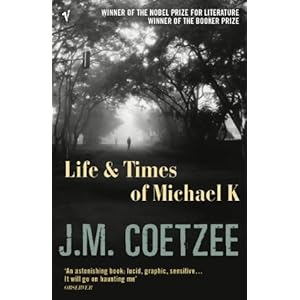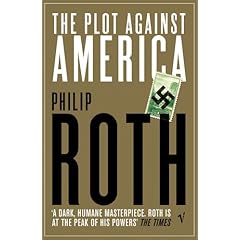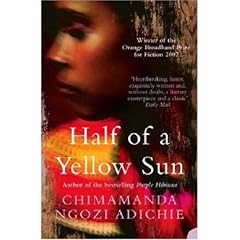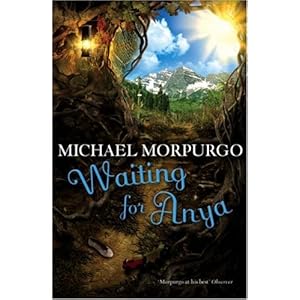
So, you start a book which is meant to result in emotional upheaval, and you keep your distance to begin with, but then the book sucks you in, and you feel your emotions getting the better off you, while the writing itself remains simple and straightforward, with almost no sentimentality. And as you keep turning the pages, you just want the happy ending; the fairy-tale happily ever after. And then the book ends, and you're just sitting there holding it, stunned into disbelief by the response evoked by a book less than two-hundred-and-fifty pages long.
It's Christmas Day, 1943, when Hilary, a poet and an intellectual, learns that his little boy, John, is lost. Lisa, his wife who was involved in the Resistence, was killed in Paris by the Gestapo, but before her death, she had asked a friend to look after her baby, who Hilary had seen but once. But on that fateful Christmas Day, a stranger (a Frenchman named Pierre) knocks on the door of Hillary's English home, informing him that his son has disappeared without a trace, and he would like to help Hillary find the boy.
Post-war, Hillary reluctantly heads to Paris upon Pierre's request, in order to commence the search for the lost boy - a search that has already been initiated by the resourceful Pierre. But Hilary is not prepared for the war-ravaged Paris that greets him.
Yes, it was familiar again - until the bus creaked past the bombed factory, the makeshift bridge, the shattered rusting locomotives, and the English in the bus shamefacedly whispered to each other, "Do you think we did that?" and then wondered if there could still be friendship between the destroyer and destroyed.
Simply, eloquently put.
Hilary starts following the trail which could potentially lead him to the son he lost about two years ago - almost unwillingly - for, with time, he's made himself invulnerable to emotions, and is content to live in his memories. The search leads him to a convent in a small town in France, where a boy who might be his son lives. It's not definite, but the age and blood type match. The hope is that on seeing the boy, Hilary would recognise his son.
Hilary visits the boy (called Jean) in the convent, and starts spending a couple of hours each day with the boy, his affection for the slowly mounting, but the uncertainty as to whether the boy is actually his son not really diminishing. The first meeting is confusing, as at first glance, he thinks that's his son, but on second glance, he stares at the child in horror and repulsion, certain that the child isn't his...
...and thus begins the journey of trying to determine if he's found his little boy...
...But then, Hilary is detached, pragmatic and almost like an icicle at times, that one just wants to physically shake him into finding his human emotions - diametrically polar to some other moments where he buys the child expensive gloves, and gauges his reactions, without the child having to say much, if anything at all.
As the relationship evolves during the course of the week, the child transforms from a shy nervous boy to an excited happy one around Hilary. You can make out that he doesn't want to disappoint Hilary, and when Hilary comes across as impatient, the boy withdraws into himself. There are moments where, as a reader, you just hate Hilary, for how can someone be so heartless?
Hilary said nothing. He stood there watching the child, feeling only hate for the creature who had put him in this predicament, through whose interventions he had made a fool of himself. The little coward, he was saying, the little coward.
Jean whimpered, "I want my red gloves back."
You're finding out you can't buy happiness, thought Hilary coldly. Aloud, he said, "You can't have them back. Once you've given a present, it's a present forever."
Jean stopped whimpering, only stood there shaking and staring. You're finding out what desolation means, thought Hilary savagely [...].
But - but it's the absolute last line of the book that makes it so... touching and heart-rending. Just the last line. Honestly, words cannot describe the impact they make.
While the heart of the book is about the father looking for his lost son, Laski pays attention to the rampant corruption existing in Paris at the time, and the black market, which emphasised the difference between the haves and the have-nots, and the whole "survival of the fittest" philosophy. She also highlights the slight disconnect between the locals, as they attempt to determine on which side their counterparts stood during the Occupation.
"But at least the Occupation showed each man what he was capable of. Don't you think it was something to be able to find out?"
"No, why?" said Pierre. "Some found they were better than they thought, some worse. We are finding that out all the time in our everyday lives."
"But we're not conscious of it all the time," argued Hilary. For some reason, this point seemed of vital importance to him. "Surely occupation or battle or something like that brings the whole thing to an inescapable point - a sort of judgment by ordeal?"
If you haven't yet, please do read this book.
I've read two books by Laski so far, and have two more to go (which have been printed by Persephone) - her writing is amazing, and I can't wait to read the others.
 If there was ever a book that just made you feel slightly uneasy, a tad queasy, very uncomfortable, but still had you hooked, this would be it.
You have Brodeck, who survived being treated like a dog - literally - in a prisoner-of-war camp, in France, during an unnamed war, albeit implicitly it suggests that the war is World War II. He returns to his village, a changed man, and as he goes through the motions of ordinary life, he is still haunted by the past. The growing xenophobia and animosity in the village doesn't really help either.
If there was ever a book that just made you feel slightly uneasy, a tad queasy, very uncomfortable, but still had you hooked, this would be it.
You have Brodeck, who survived being treated like a dog - literally - in a prisoner-of-war camp, in France, during an unnamed war, albeit implicitly it suggests that the war is World War II. He returns to his village, a changed man, and as he goes through the motions of ordinary life, he is still haunted by the past. The growing xenophobia and animosity in the village doesn't really help either. I've been meaning to read a Laski for a long time, and I finally picked this book out of my shelf, just to help me return to the world of reading - one of my many loves that I've been ignoring recently. And on finishing it, I was gently reminded as to why I love reading so much.
I've spent the past couple of months literally obsessing over things, and trying to make a life-changing decision (career-wise). However, while reading (and on finishing) this book, I almost immediately started focusing on the points it raises and the questionable character of this book's protagonist. Annoyingly, I can't seem to make my mind up about where I stand.
I've been meaning to read a Laski for a long time, and I finally picked this book out of my shelf, just to help me return to the world of reading - one of my many loves that I've been ignoring recently. And on finishing it, I was gently reminded as to why I love reading so much.
I've spent the past couple of months literally obsessing over things, and trying to make a life-changing decision (career-wise). However, while reading (and on finishing) this book, I almost immediately started focusing on the points it raises and the questionable character of this book's protagonist. Annoyingly, I can't seem to make my mind up about where I stand. Life and Times of Michael K won the Booker Prize in 1983, and it's been one of Coetzee's books that I've wanted to read for a really long time. The name intrigued me: who is Michael K? And, what is it about his life and times that merits a novel?
Life and Times of Michael K won the Booker Prize in 1983, and it's been one of Coetzee's books that I've wanted to read for a really long time. The name intrigued me: who is Michael K? And, what is it about his life and times that merits a novel?
 This is another one of my reviews that have been pending for over a month. While I'm reading the super-chunky Midnight's Children, I thought it's a good time to get up-to-date with some of the reviews which really should have been written earlier.
This is another one of my reviews that have been pending for over a month. While I'm reading the super-chunky Midnight's Children, I thought it's a good time to get up-to-date with some of the reviews which really should have been written earlier. This review has been outstanding for about a month and a half, and for that I apologize. I read it back when I was working towards a big deadline, and I just didn't find time to review it back then. But here it is, now...
This review has been outstanding for about a month and a half, and for that I apologize. I read it back when I was working towards a big deadline, and I just didn't find time to review it back then. But here it is, now... War destroys all that is left of innocence. It pulls people together, and it drives them apart. People are left asking questions, as they pine for their loved ones, as they try and contemplate the horrors of war, and as they struggle to survive - just so that they can see a better day.
War destroys all that is left of innocence. It pulls people together, and it drives them apart. People are left asking questions, as they pine for their loved ones, as they try and contemplate the horrors of war, and as they struggle to survive - just so that they can see a better day. Twelve year old Jo, a shepherd boy, lives in a small French mountain village, during the late 1930s-early 1940s. World War II's broken out, and Jo's father is away in action, while Jo is assuming some of his father's responsibilities, and simultaneously attending school. The War is far away from this village, and to Jo it almost seems quite unreal, and he's unsure of his opinion about it.
What Jo thought about the war and about the occupation seemed to depend on whether he had just talked to Maman or to Grandpere: he could never make up his mind.
Twelve year old Jo, a shepherd boy, lives in a small French mountain village, during the late 1930s-early 1940s. World War II's broken out, and Jo's father is away in action, while Jo is assuming some of his father's responsibilities, and simultaneously attending school. The War is far away from this village, and to Jo it almost seems quite unreal, and he's unsure of his opinion about it.
What Jo thought about the war and about the occupation seemed to depend on whether he had just talked to Maman or to Grandpere: he could never make up his mind.  I don’t know why I picked up this book. It might have been because I’ve got The Butterfly Lion and Private Peaceful on my reading list. It might be because it was the only book that looked tempting at Waterstones the other day (and I couldn’t find a copy of The Great Gatsby - the book I actually wanted to purchase). I don’t know - but, I picked it up, and silently cursed myself, for... the last couple of times I’ve picked up a book without reading any reviews, I’ve regretted it (Suspicions of Mr. Whicher being a prime example). But, this book ended up restoring my faith in impulsive book buying.
I don’t know why I picked up this book. It might have been because I’ve got The Butterfly Lion and Private Peaceful on my reading list. It might be because it was the only book that looked tempting at Waterstones the other day (and I couldn’t find a copy of The Great Gatsby - the book I actually wanted to purchase). I don’t know - but, I picked it up, and silently cursed myself, for... the last couple of times I’ve picked up a book without reading any reviews, I’ve regretted it (Suspicions of Mr. Whicher being a prime example). But, this book ended up restoring my faith in impulsive book buying. A young boy, with the help of a prison guard, escapes from a concentration camp and tries to find his way to Denmark. David is convinced that there is some kind of catch, and there will be people waiting to catch him, punish him and throw him back in the camp, at every point during the initial stages of the escape. Only then does he start believing he can actually escape, and leave the horrors of the concentration camp far behind.
A young boy, with the help of a prison guard, escapes from a concentration camp and tries to find his way to Denmark. David is convinced that there is some kind of catch, and there will be people waiting to catch him, punish him and throw him back in the camp, at every point during the initial stages of the escape. Only then does he start believing he can actually escape, and leave the horrors of the concentration camp far behind.